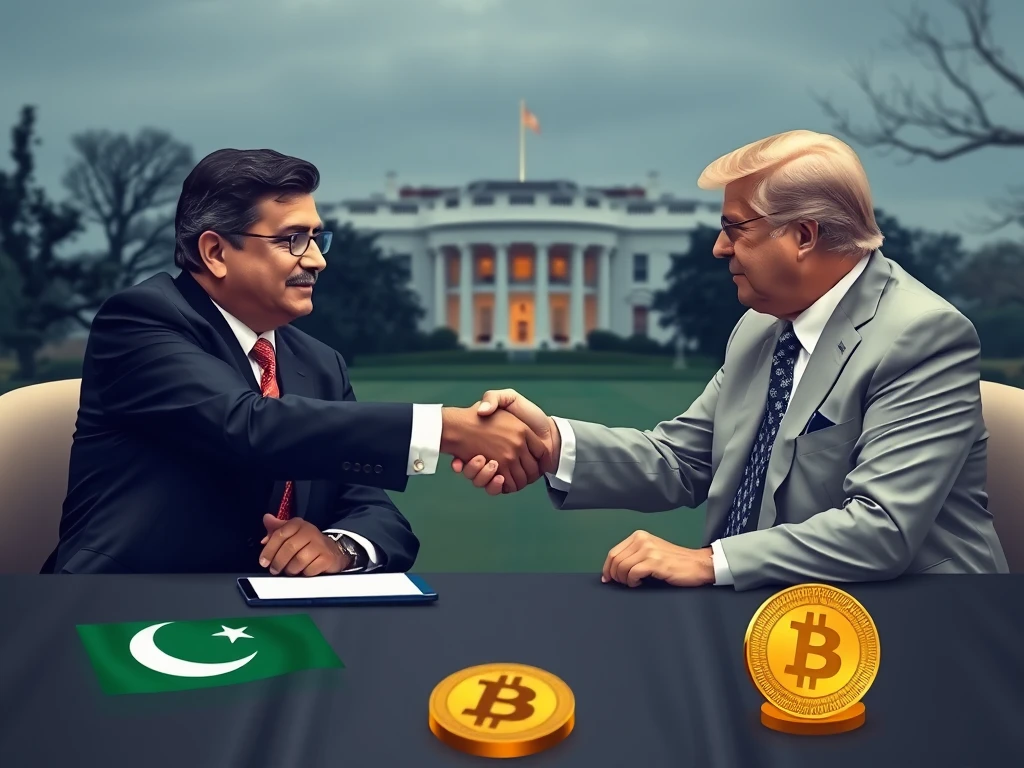Pakistan Unveils Bold Bitcoin Reserve Plan to Trump Crypto Team

The world of digital assets is constantly evolving, and recent developments show that even nations are looking to stake their claim. A significant meeting recently took place at the White House, where Pakistan’s crypto minister presented ambitious plans regarding a Strategic Bitcoin Reserve and broader digital asset infrastructure to former President Donald Trump’s digital asset leadership team. This move signals a growing interest among nations in leveraging cryptocurrencies and blockchain technology for economic development and positioning themselves in the global digital economy.
Pakistan Bitcoin Strategy Shared with Trump Crypto Team
Pakistan’s Minister of State for Crypto and Blockchain, Bilal Bin Saqib, met with Robert “Bo” Hines, Executive Director of former US President Donald Trump’s Council on Digital Assets. The discussion focused on enhancing cooperation between Pakistan and the United States in the digital assets sector. Key topics included Bitcoin (BTC), potential partnerships, and the future of decentralized finance.
According to reports, a central point of dialogue was Pakistan’s newly announced Strategic Bitcoin Reserve. Minister Saqib stated his mission is to position Pakistan as a global leader in digital assets, highlighting plans beyond the reserve, including:
- Unlocking national infrastructure for crypto mining.
- Establishing AI data zones.
- Building a framework for digital asset adoption and economic modernization.
Robert “Bo” Hines, appointed to lead US policy on digital assets, works alongside Council Chair David Sacks, reflecting the Trump administration’s interest in the US leading the digital asset space.
Ambitions for a National Bitcoin Reserve and Infrastructure
Pakistan’s strategy includes concrete steps to integrate digital assets into its national infrastructure. A major component is the plan to allocate 2,000 megawatts of surplus power. This energy is intended for two primary uses: powering Bitcoin mining operations and supporting AI data centers. The goal is to convert unused energy resources into digital productivity, create jobs, and expand national infrastructure capabilities.
Minister Saqib emphasized that the Strategic Bitcoin Reserve is part of this larger framework aimed at modernizing Pakistan’s economy through digital asset adoption.
Establishing the Digital Assets Authority
Alongside infrastructure plans, Pakistan is developing a formal regulatory framework. On May 21, Pakistan’s Ministry of Finance endorsed the creation of a dedicated body, the Pakistan Digital Assets Authority (PDAA). This authority will oversee and regulate various aspects of the digital asset ecosystem, including:
- Licensing and regulating exchanges.
- Overseeing custodians and wallets.
- Managing tokenized platforms.
- Regulating stablecoins and decentralized finance applications.
The establishment of the Digital Assets Authority is a clear step towards providing legal clarity and oversight for the growing crypto sector in Pakistan.
IMF Raises Concerns Over Bitcoin Mining Pakistan Plans
While Pakistan pushes forward with its plans, the International Monetary Fund (IMF) has raised concerns. On May 31, the IMF questioned Pakistan’s decision to allocate 2,000 megawatts for Bitcoin mining and AI data centers. This came during ongoing negotiations for Pakistan’s financial program.
The IMF requested clarification from the Finance Ministry regarding the legality of crypto mining and the specifics of the power allocations, particularly given Pakistan’s existing energy shortages and fiscal pressures. This highlights a potential challenge in balancing ambitious digital asset plans with immediate economic constraints and international financial obligations.
Summary: Pakistan’s Digital Asset Push
Pakistan is actively pursuing a strategy to become a leader in the digital asset space. This includes planning a Strategic Bitcoin Reserve, dedicating energy resources to Bitcoin mining Pakistan and AI, and establishing a regulatory body, the Digital Assets Authority. Sharing these plans with the Trump crypto team at the White House signifies a desire for international cooperation and recognition. However, the initiative faces scrutiny, particularly from the IMF, regarding the allocation of resources like electricity. Pakistan’s approach represents a bold step into the digital economy, aiming to transform national infrastructure and create new economic opportunities.









